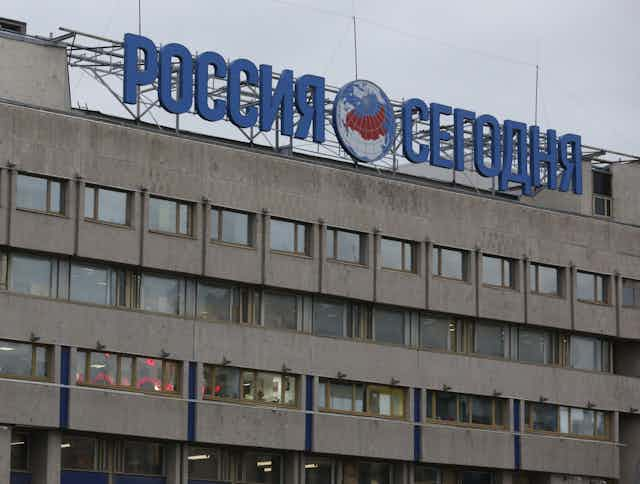The recent decision of the National Westminster Bank to freeze the UK accounts of Russian international broadcaster RT sparked a furious row, with talk of Kremlin disinformation pitted against accusations of British suppression of free speech.
It’s the latest blow in a propaganda war that has raged between Russia and the West since before World War II and which characterised the cold war era. If, as many people are now saying, the world is now descending into a new “cold war”, then it seems fitting that the first casualties appear to be truth and free speech. How did we get here?
RT was launched as Russia Today in December 2005, with the purpose of improving Russia’s image in the West with the catchphrase: “Question more”. The network, which broadcast 24-hour English-language news from studios in Moscow, was – and is – run by Margarita Simonyan – at 25 when appointed, the youngest ever chief executive to run a TV news network.

RT’s reach was gradually expanded until it was broadcasting out of Moscow, Washington and London and, in October 2014, a dedicated 24/7 UK news channel was added. RT’s job, said Vladimir Putin, was to “break the Anglo-Saxon monopoly on global information streams”.
This idea of a balance for the flow of Western information has, however, quickly come into question. Instead of just depicting Russia in a positive light, RT’s output focuses strongly on painting a negative picture of the West. The network particularly trained its sights on the BBC. In 2015, one of RT’s flagship programmes, Truthseeker, accused the BBC of “staging” a fake chemical attack for “Saving Syria’s Children”, a report on the Syrian war. Ofcom (the UK regulator for communication industries) later ruled in favour of the BBC, calling RT’s claims “materially misleading”.
Another episode of Truthseeker from 2013, “Genocide in Eastern Ukraine” – which claimed that the Ukrainian government was carrying out ethnic cleansing and crucifying babies – was also judged by Ofcom to be in breach of the UK’s broadcasting code. These are just two examples – of many.
But the question remains whether all this is enough to justify the actions of NatWest – which, it should be remembered, is part of the Royal Bank of Scotland group which is majority owned by the UK government. The fact that NatWest has already taken some steps back, announcing that it is “reviewing the situation” and “contacting the customer” does not change the basic facts. Trying to close down RT will be used by Russia to support the thesis that there is no freedom of speech in the supposedly democratic West. Simonyan has already tweeted as much.
Selling Stalin
During the “original” cold war, the propaganda arm of the Soviet Union in the West was the Cominform, the Communist Information Bureau, founded by Stalin in 1947. While its official purpose was to encourage international communist solidarity, the Cominform’s true goal was to oppose the Marshall Plan, which aimed to foster stability and prosperity by rebuilding Europe’s battered economies.
Stalin believed that the Marshall Plan would stifle the growth of Communism in Europe. Meanwhile Washington, seeing that propaganda was going to play a decisive role in the cold war, set up Voice of America, which still exists today as a US government-funded multimedia news source. Voice of America – which had been set up to broadcast into Nazi-occupied Europe during World War II, began broadcasting Russian language programming in 1947 and became a powerful tool during the cold war.

More recently, in 2015, the US Congress passed a law to – as TIME Magazine put it: “Make the state-funded Voice of America a more direct mouthpiece for US foreign policy, shifting away from its mission of providing uncensored local news in places where it’s hard to find”.
It is very easy then to draw a parallel with RT which, according to Putin, plays the same role for modern Russia the same function that Voice of America did for the United States. Voice of America today, however, is governed by a strict code that is enshrined in law – something RT cannot claim to do.
Bevin’s baby
Britain’s own answer to the Cominform was the creation in 1948 of the Information Research Department (IRD), under the aegis of then foreign secretary, Ernest Bevin. The IRD was founded “to gather confidential information about Communism and produce factually based anti-Communist propaganda”.
The BBC Overseas Service was used as a powerful vehicle for the dissemination of IRD production overseas – a strategy plotted by the Foreign Office and carried out with the approval of the BBC itself, for all its much vaunted editorial independence.
Bevin firmly believed that the cold war would be won on the ideological battlefield. He thought that promoting the values of Western and British democracy was the best way to fight Communism in the world without increasing international tensions
So NatWest’s decision, if interpreted as the latest act of this modern cold war’s media warfare, seems very far from Bevin’s vision. It has done nothing to decrease tensions and – in terms of promoting Western values such as freedom of speech – unilaterally shutting down a broadcaster’s account seems more something that would happen in Stalin or Putin’s totalitarian state than in “liberal” Britain.

